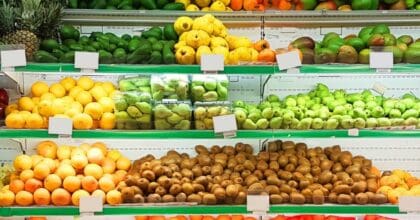Meal kit companies should embrace e-commerce to become true online grocery retailers and provide consumers with flexible, convenient meal solutions.
Meal Kit Demand Surged, But Consumers are not Sold on Subscriptions
During COVID-19, US consumers turned to meal kits in droves. These companies saw sales surge, as meal kits offered a safe, convenient method to get dinner on the table. If consumers become less dependent on meal kits, innovation in prepared food services will be necessary to ensure continued interest and market growth.
While meal kit services will still appeal to some users, the greater opportunity in this space will come from following the trends that have emerged in recent years. Hello Fresh and it’s competitors, such as Home Chef, Gobble, Dinnerly and Blue Apron, have delved into alternative strategies for broadening their customer base. For example, Blue Apron created an online marketplace for subscribers to add other grocery items to their meal purchases, such as produce, proteins and pantry staples.
There is an opportunity for meal kit services to transform more fully from retail subscription services into online marketplaces that offer more than just meal kits and in a more flexible way. Digital services subscriptions have thrived, but will the trend in food service subscriptions be able to replicate that success?
Meal Kit Companies Have an Opportunity to Broaden Their Customer Base
Meal kit companies are missing an opportunity to attract new users by positioning themselves as a true marketplace.
Imperfect Foods and Misfit Markets are companies that originally launched by selling subscription boxes of “ugly” produce at a discount, and have grown to become more flexible online retailers that are being positioned as a dependable source of quality, affordable groceries. Meal kit companies should follow this lead and open their marketplaces to all shoppers, not just meal kit subscribers.
Food and Drink Manufacturers Have New Opportunities in Online Marketplaces
The future of foodservice has been transformed by recent events, including COVID-19, inflation, and increased reliance on e-commerce. Nearly a third of consumers now use online grocery shopping; another third say they’ve begun using click-and-collect services. Consumers’ newfound e-commerce experience, will create opportunities for food and drink manufacturers to sell their wares on the online marketplace that meal kits have created.
While all kinds of food and drink could benefit from being part of these e-commerce marketplaces, this new outlet could bring opportunities for specialty products. Online retail can provide smaller brands with exposure and drive trial since regional distribution is limited. This approach has been employed in online shops such as Pop Up Grocer, which gives curious consumers a way to curate their own boxes of specialty food and drink.
Traditional Retailers’ Challenges and Opportunities
Target’s meal bags, for instance, group a selection of the retailer’s private-label products into easy-to-assemble meals, taking out the guesswork of planning dinner while shopping. Likewise, Trader Joe’s ongoing success will no doubt be helped by their own prepared food selection.
What We Think and Key Takeaways
In the coming years, meal kit subscriptions will continue to diversify their offerings to reach a wider audience. While many services have already expanded more into e-commerce (e.g. offering “extras” for their subscribers to add on to their meals), there is untapped potential to reach non-subscribers who are looking for convenient groceries and meals from the same outlet.
Traditional retailers will need to be aware of new competition coming from online marketplaces operated by meal kit companies but they also offer shoppers many advantages. Consumers seek flexibility in their meal preparation, and a majority of consumers point to the strict schedules of meal subscriptions as a barrier to adoption. Grocery stores, whether in-store or online, give consumers the option to make regular purchases and the plethora of meal kit solutions that are now available in-store.
Social Shopping is on the Rise
Meal kit-branded “marketplaces” are the future US meal kit services that have expanded their offerings to include other non-kit options such as specialty food, pantry staples and ready meals allowing companies to provide more options.
A New Avenue for Product Discovery
US CPG companies, especially specialty brands, can become part of the new marketplaces that these online brands offer. This could be a viable alternative to sampling to promote trial and exposure.
Online marketplaces could challenge retailers like Imperfect Produce and Misfit Markets, and give savvy shoppers an additional option for purchasing groceries. Traditional retailers can change by promoting the flexibility that they already offer, including single-serve meal kits.
Explore our Grocery Retail Market Research, or fill out the form below to sign up to Spotlight, Mintel’s free newsletter for exclusive insights.








































